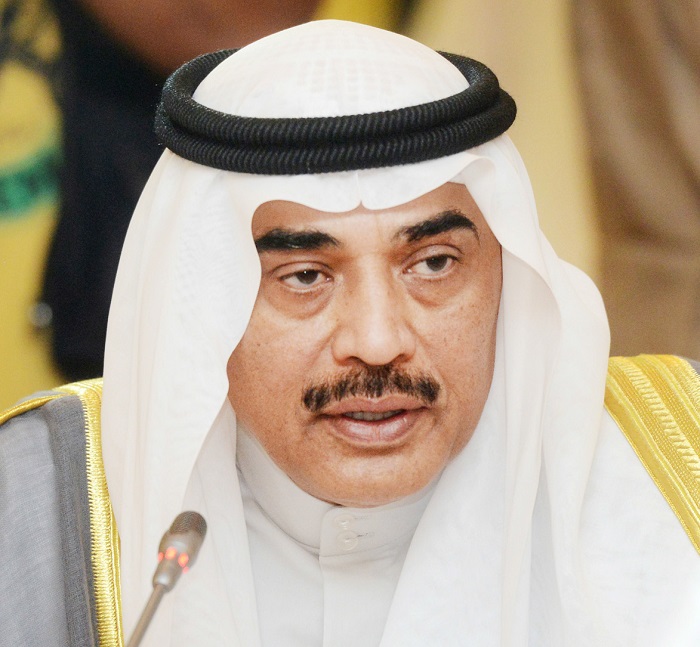His Highness Sheikh Sabah Al-Khalid Al-Sabah
First Deputy Prime Minister and Foreign Minister Sheikh Sabah Al-Khaled Al-Hamad Al-Sabah said last week Kuwait and Germany enjoy historical ties and mutually beneficial cooperation in all fields notably economy, investment and commerce. Addressing a joint press conference with German Foreign Minister Frank-Walter Steinmeier after their meeting, Sheikh Sabah said the meeting explored ways for pushing the bilateral ties to an even higher level.
“Special ties between the two countries featured prominently in 1990 when Germany fully supported Kuwait against the Iraqi invasion and backed all relevant UN resolutions,” he said, affirming that Kuwaitis will always remember this supportive stance. “Kuwait holds in high esteem the close ties and friendship with Germany over more than five decades,” said Sheikh Sabah Al- Khaled, who paid an official visit to Germany on the occasion of the 50th anniversary of the establishment of diplomatic ties.
On his talks with Steinmeier, he said the talks showed that both sides hold identical views on almost all regional and international issues. “We have discussed the implementation of the signed agreements, as well as a range of bilateral and regional issues, notably the humanitarian crisis in Syria,” he pointed out. “We have also discussed the mechanism of the Gulf-European cooperation, particularly in the run-up to the joint meeting, due on June 23,” Sheikh Sabah Al-Khaled revealed. He added that he has raised the issue of Kuwait quest for joining the Schengen visa exemption scheme, noting that Kuwait made an official application in this regard to the European Commission last February. “Germany is an important economic and investment partner for Kuwait.
The volume of Kuwaiti investments in Germany exceeded US$ 30 billion,” he said, noting that both sides boast these stable investments for their strategic dimension and immunity to speculation or transient profiteering. “Despite the financial meltdown in Europe in late 2008, Kuwaiti investments in Germany kept growing. This signals Kuwait’s trust in the investment atmosphere in Germany and Kuwait’s remembrance of supportive stance of Germany in 1990. “Both sides welcome the growth of the mutually-beneficial investments of Kuwait in Germany,” he said, promising that Kuwait will pursue its current investment policy.
The partnership between Kuwait and the Daimler Group is a good manifestation of the Kuwait-German friendship; both sides will mark the 40th anniversary of the partnership this year, Sheikh Sabah said. The historic visit paid by His Highness the Amir Sheikh Sabah Al-Ahmad Al-Jaber Al-Sabah to the Berlin-based Group in 2010 gave momentum to the partnership, he added.
On his part, Steinmeier lauded as very important the Kuwait-German relationship. Kuwait, as a key partner for Germany, does its utmost to restore concord and stability in the Middle East region, and plays an important role in resolving the conflict through a wise and balanced policy, he said. The German minister cited as an example Kuwait’s efforts to stabilize Yemen and prevent the escalation of conflict there. He affirmed keenness of both sides to continue developing bilateral ties and cooperation and sharing views on the latest developments on the regional and international arenas One recent testimony to the strength of relations was the visit by His Highness the Amir Sheikh Sabah Al-Ahmad Al-Jaber Al-Sabah to Germany in 2010.
The visit gave further impetus to relations in diverse sectors and interaction between business establishments in particular expanded to include medium and small-size companies. Kuwait was already a major investor and the first Arab investor in Germany. Through Kuwait Investment Authority (KIA), the country holds major stakes in an array of German corporations. After the acquisition of a 13 percent stake in Daimler-Benz back in 1974, Kuwait now holds a 7.6 percent stake in the Daimler Group, meaning it is the biggest offshore investor in the major automobile industry group.
The two countries signed a host of agreements in the commerce and industry sector, most important among which are agreements on encouragement of investment and on avoiding double taxation. In early 2001, Kuwait dramatically curbed tax on foreign companies in its local market with the aim of attracting foreign companies, German corporations included, as it initiated mega development plans.
By 2012, German exports to Kuwait came to euro 1.02 billion, and the country was the fourth biggest exporter to the Gulf nation. Last year’s imports of German products and equipment came to euro 1.2 billion. The health sector is another field of active interaction between the two countries.
The Kuwaiti Health Ministry signed an agreement with Vivantes International Medicine, Germany’s largest state-owned healthcare group, which is of great help to Kuwaitis wishing to receive treatment and care in German hospitals. Virtue of this agreement, Kuwaiti patients get to benefit from care at Vivantes’ nine world-leading hospitals, specifically in the areas of orthopedic surgery, oncology, and hematology.
The agreement is also a framework for exchange of expertise among medical staff and specialists through hosting of German specialists in Kuwaiti health care facilities as well as through sending Kuwaiti specialists for experience in German facilities. With help of special facilities Germany extended to patients from Kuwait and the Gulf Cooperation Council (GCC), the number of Kuwaitis who seek care in the European country is on the rise. Statistics indicate GCC nationals account for the biggest percentage of off-shore patients. The number came close to 5,000 GCC nationals in 2011.
The two nations also enjoy strong relations in the field of education with an agreement signed in 2009 to secure seats for Kuwaiti students in leading German universities, in fields topped by medicine and engineering. At present, 50 Kuwaitis are working on their board certification in German universities, sent on Civil Service Commission scholarships. When it comes to tourism, the Kuwaiti Ministry of Commerce and Industry took part in Berlin’s International Tourism Bourse (ITB) 2014 to increase exposure to European and international tourism markets along with participants from 180 countries.

